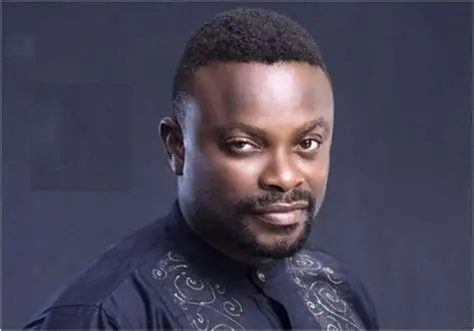Popular Nollywood actor Ime Bishop Umoh, better known by his stage name Okon Lagos, has called on the Federal Government to release detained Indigenous People of Biafra (IPOB) leader, Nnamdi Kanu.
The comic actor appeared in a recent episode of The Clarity Zone podcast, where he spoke about peace, reconciliation, and the need to address long-standing grievances in Nigeria’s South-East region.
Okon argued that Kanu’s continued detention has become a stumbling block to national peace. According to him, the federal government should set aside strict legal considerations and embrace reconciliation by freeing the IPOB leader.
“I am one million per cent of the opinion that Nnamdi Kanu should be freed. Free him,” he declared. “It may not make legal sense depending on what they have claimed, that the evidence that have been put in the fore of the ‘crimes’ he has committed. It doesn’t need to make legal sense, but it makes moral common sense.”
Read Also: Obi slams continued detention of Nnamdi Kanu
His comments came during a discussion with media personality Nedu Wazobia, who pressed him further on what he meant by “moral common sense.”
Okon responded that Kanu’s agitation for Biafra’s secession was not born out of criminal intent but out of emotional frustration with the perceived marginalisation of the Igbo people in Nigeria.
“It is morally right,” he said. “Of course, he is a human being and he took emotional decisions, and emotional decisions are not right decisions. He felt that his people were being marginalised and he started agitating for Biafra’s secession.”
For Okon, granting Kanu freedom would send a powerful signal that the government values peace, healing, and national unity above political or legal battles.
Nnamdi Kanu, leader of IPOB, was first arrested in 2015 on charges bordering on treason and incitement. After being granted bail in 2017, he fled Nigeria but was rearrested in Kenya and extradited to the country in 2021 under controversial circumstances.
Since then, Kanu has remained in the custody of the Department of State Services (DSS), facing multiple charges in court. His prolonged detention has sparked protests, sit-at-home orders in the South-East, and calls from prominent voices urging the government to release him in the interest of peace.
While the Supreme Court in December 2023 ruled that Kanu must continue his trial, his lawyers and supporters have consistently argued that his arrest and extradition violated international law.
Okon Lagos joins a growing list of public figures, politicians, and civil society leaders calling for Kanu’s release. Several Igbo leaders, including state governors and traditional rulers, have appealed to President Bola Tinubu to adopt a political solution rather than a legal one.
They argue that freeing Kanu would calm tensions in the South-East, reduce violence, and create room for dialogue.
Okon seeks focus on healing divisions
In his remarks, Okon stressed that Nigeria must focus on healing divisions rather than deepening them. He explained that while the law may demand punishment, true leadership sometimes requires forgiveness.
“Freeing him doesn’t have to make legal sense,” the actor insisted. “But it makes moral sense because it can give his people hope and make them feel seen.”
He also pointed out that emotional reactions often lead people to make decisions they later regret, but such mistakes should not define them forever. “He is a human being first,” Okon said of Kanu.
Okon’s comments have sparked reactions online, with some Nigerians praising his courage for speaking on such a sensitive issue. Supporters of Kanu welcomed the remarks, describing them as a reflection of the Igbo struggle for fair treatment.
Others, however, criticised the actor, insisting that the law must take its course and warning that pardoning Kanu could set a dangerous precedent for secessionist movements.
As debates continue, Kanu’s detention remains a contentious issue in Nigerian politics. For now, the government insists that the courts must handle his case, but voices like that of Okon Lagos add to the pressure for a political solution.
Whether or not the federal government heeds these calls, Okon’s remarks highlight the growing demand for reconciliation and the urgent need to rebuild trust between the South-East and the Nigerian state.



